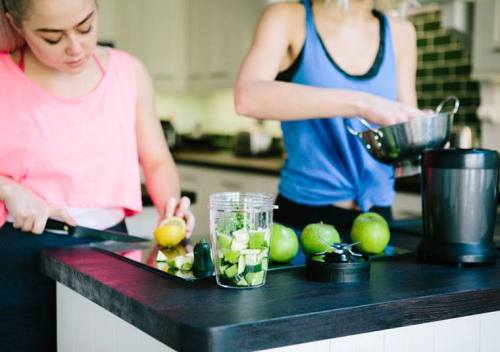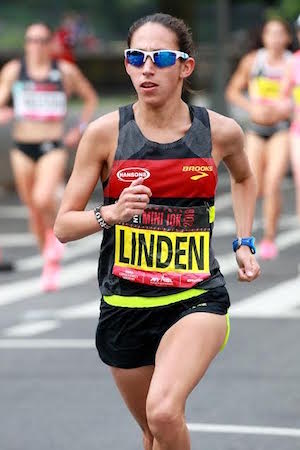
Photo: Victah SailerLong-run days are important for building endurance if you’re training for a race, but it’s also a critical time for testing out what your stomach can—and can’t—handle when it’s time to clock in miles (be it 5 or 26.2).
Ever hit the starting line with too much water sloshing around your belly? Or eat something you thought was totally nutritious, only to later have it feel like a rock weighing you down? Not exactly what you want to focus on when you’re working toward that finish line.
To get some advice on what to eat—while you train, the night before the big day, and during the race itself—I tapped marathon runner Desiree Linden. She placed seventh in the 2016 Olympic marathon and was the fastest American woman at both the 2014 New York City Marathon and the 2015 Boston Marathon (NBD), so she knows a thing or two about properly fueling up before hitting the pavement.
Linden took a break from training for the United Airlines NYC Half to reveal her eating-while-training tips here. Keep reading for her advice.

On long-run days
These are perfect trial-and-error times for anything you plan on eating while you run, like energy gels and electrolyte waters, Linden explains.
“Research and find out what sorts of things will be handed out on the course and practice with those,” she suggests. “If you’re worried about how an energy gel or gummy will hit your stomach, practice on your long-run days—don’t wait until race day to try something for the first time.”
Ditto for your breakfast—Linden’s pro tip is to try our whatever you’ve planned, to see how it feels.
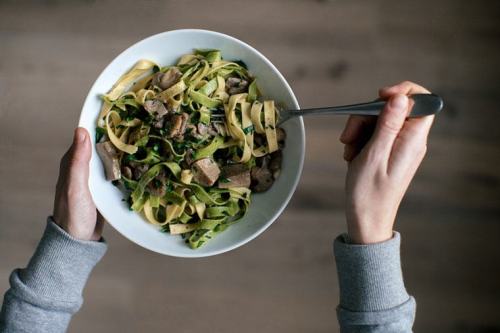
Two weeks out
This is when you need to start adding more carbohydrates into your diet and less protein, Linden says. “Protein is important early on during training because it helps build muscle, but it can sit heavy in your stomach,” she explains. “The carbs are the fuel your body will need on race day.”
A sample of her meals two weeks out: peanut butter and toast for breakfast, and rice or pasta for lunch and dinner. She still has veggies (sweet potato is her go-to), but reduces the amount during those last two weeks. “You want to cut back on fiber a bit to make room for more fuel food, AKA carbs,” Linden says.
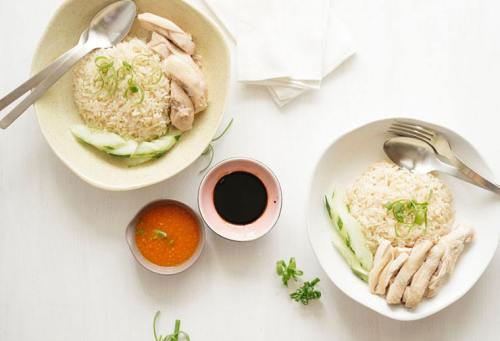
The night before
The key to that final pre-race dinner is to give your body something easy to digest, according to Linden. “I usually have white rice, a little bit of chicken, and maybe sweet potatoes to add some color,” she says.
Sure, it may sound kind of bland, but you don’t want your body to still be processing food when you wake up the next morning. Besides, your next dinner will be a celebration meal—and it’s less than 24 hours away.
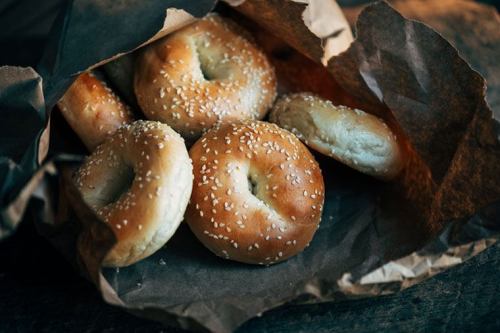
The day of the race
You should definitely have your breakfast planned out ahead of time—after all, you’ve tested it already. For Linden, it’s a bagel with peanut butter, the perfect carb-protein meal. “You want to eat about three hours before your run, giving your body plenty of time to digest it,” she says.
During the race, staying hydrated is key. “For a marathon, the standard rule is to drink 6 to 8 ounces every 20 minutes, but if you’re running a half marathon, you can get by with a little less,” explains Linden.
When you start to feel tired, go for electrolyte water or endurance gel—but don’t do both at the same time. “It’s too much sugar for the body to process all at once, so if you have a gummy or gel, make sure to wash it down with regular water,” she advises.
“Eat whatever you can get your hands on at the finish line, like a banana or nutrition bar. Anything to help your body recover right away.”
As soon as you cross the finish line, it’s time to start refueling the body. “Eat whatever you can get your hands on at the finish line, like a banana or nutrition bar,” Linden says. “Anything to help your body recover right away.”
But then later—perhaps after a long, luxurious shower—comes the fun part: the celebratory meal. “You’ve been eating for function for weeks and now it’s time to eat for fun,” she says. Whatever you’ve been craving—go for it. “For me, that’s a burger loaded with jalapenos, a side of fries, and washed down with a beer.” Victory tastes pretty freakin’ good, doesn’t it?
Now that you have your eating plan down, here’s a sample training schedule to use as a guide. Plus, check out everything a runner actually needs—nothing gimmicky!
Sign Up for Our Daily Newsletter
Get all the latest in wellness, trends, food, fitness, beauty, and more delivered right to your inbox.
Got it, you've been added to our email list.
